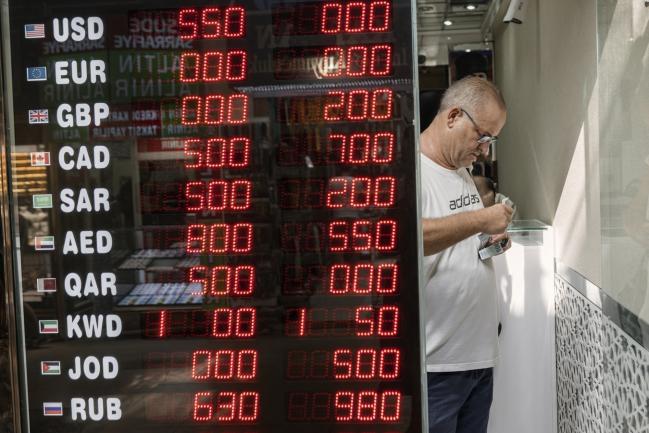(Bloomberg) -- The year has been great so far for risk assets from stocks to credit, and emerging-market assets have joined in the party. Except, recently, for their currencies.
Among the observations in a widening debate on the missing gains: some fund managers highlight their greater sensitivity to the risks of a global slowdown. The fact that these exchange rates have largely gone sideways since the end of January suggests continuing worries even as global equities build on their first-quarter surge.
Conversely, any pick-up in developing-nation exchange rates could be a good sign that the global appetite for risk is truly back in bullish mode.
“I see two challenges for EM currencies,” said Pierre-Yves Bareau, head of emerging-market debt at JPMorgan (NYSE:JPM) Asset Management in London. “First, the U.S. dollar is still rather strong. Secondly, the market needs to see more growth bottoming out to buy the 2018 growth laggards -- like emerging markets.”
Following are a variety of perspectives on the missing rally in developing-nation currencies:
Growth Problem
While bonds and stocks have been able to take heart from central banks’ shift away from policy normalization, for the currency market, it’s going to take actual evidence of an acceleration in growth before a reaction occurs. That’s the thinking of Bryan Carter, head of emerging-market fixed income at BNP Paribas (PA:BNPP) Asset Management in London.
The very reason for the Fed’s about-face after all was the sluggish economic data and growing risk of a “growth shock,” Carter said. “We don’t see FX outperforming until the data in Europe and emerging markets convincingly demonstrate an upturn, and investors reset their forward growth expectations higher.”
Dirk Willer, head of emerging-market fixed income strategy at Citigroup (NYSE:C) Global Markets in New York, puts particular blame on the euro region, saying that a weak euro has held back a rally in a number of other currencies against the dollar. That in turn has stemmed in part from the slowdown in China, on which the region has increasingly relied. With better China purchasing manager indexes, “we may be able to look forward to a turn in euro zone data as well. The pessimism surrounding the euro may start to fade, removing a headwind for EM FX,” he said.
Enough Already
After a decade of easy money from the rich world’s central banks, developed-nation fund managers might have largely had their fill of emerging market currencies. It’s a phenomenon that Institute of International Finance analysts including chief economist Robin Brooks call “EM positioning overhang.” That’s why the Fed’s dovish pivot this year -- which has helped stoke the rally in everything from stocks to corporate bonds -- isn’t having such a big impact on some exchange rates, they argue.
IIF international portfolio tracking data show “the volume of flows to have been on a steadily declining trend for many years, with each successive dovish shift from the Fed less potent than the one before,” the group wrote last month.
Weak Inflows
Kiran Kowshik at UniCredit Bank AG said he and his colleagues “aren’t really convinced” by the “overhang” theory. Instead, he highlighted in an April 2 note that foreign-direct investment inflows “have stagnated at weaker levels” for emerging markets. FDI and current-account flows don’t tend to shift quickly based on shifting central bank policies or global risk appetite, he noted.
The bigger problem is that emerging-market growth has suffered a structural slowdown in recent years, offering little incentive for developed-nation investors to pour in. Another flow dynamic to note: the moves that some current-account deficit countries took to reduce their vulnerabilities since the 2013 taper tantrum are largely done, he argued.
‘Twice Shy’
In something of a parallel hypothesis, Morgan Stanley (NYSE:MS) currency strategists led by Hans Redeker in London detect a hesitation among investors who had anticipated a bigger dollar reaction out of the Fed’s abandoning plans for further interest-rate hikes this year. For the record, this group anticipates that will change providing growth outside the U.S. -- and particularly China -- continues to improve.
“Despite these growing signs that EM FX will gain and the dollar weaken, investors seem cautious with low conviction,” Redeker and his colleagues wrote April 4. “‘Once bitten, twice shy’ seems to be the view. After all, false starts have happened before and the surprising stability in FX has left investors waiting for clearer signals.”
No Outlier
Further on the Fed’s tilt, a number of analysts highlight that the move hasn’t had as much of an impact in the foreign-exchange market because other central banks have shifted too, including in emerging markets. India last week lowered its benchmark rate for the second time this year.
The Fed did a big pivot but everyone else became dovish very quickly after that, said Nick Eisinger, who co-manages Vanguard Asset Management’s global EM active fixed-income funds totaling $10 billion in London. “Potentially emerging-market currencies can be a more interesting trade going into the second quarter,” he said, pointing like the Morgan Stanley team to better China data.
Political Volatility
“Upside for EM currencies seems capped due to the volatility coming from places like Turkey,” said Patricia Perez-Coutts, a money manager at Westwood Management Corp. in Toronto. Turkish President Recep Tayyip Erdogan “recently came up with a policy of squeezing funding for those who want to hedge. This sent shock-waves across many EM markets, such as Brazil, whose currency came off sharply on the news.”
Brazil itself “has been wobbly of late. There are cracks on the path of acceptance of the new fiscal reform,” she said.
Differentiation Game
Many market participants say it’s a mistake to regard the emerging currencies as a bloc. Bareau at JPMorgan Asset said that capital flows and balance of payments will differentiate the currency laggards from the leaders, and that Asian assets appear in a good position.
Similarly, Kowshik at UniCredit favors currencies of economies with strong combined current-account and FDI positions. Russia’s ruble “appears relatively resilient,” he wrote.
